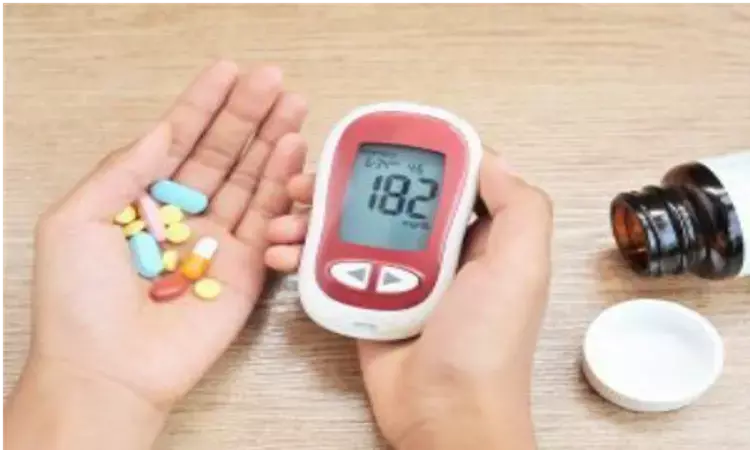- Home
- Medical news & Guidelines
- Anesthesiology
- Cardiology and CTVS
- Critical Care
- Dentistry
- Dermatology
- Diabetes and Endocrinology
- ENT
- Gastroenterology
- Medicine
- Nephrology
- Neurology
- Obstretics-Gynaecology
- Oncology
- Ophthalmology
- Orthopaedics
- Pediatrics-Neonatology
- Psychiatry
- Pulmonology
- Radiology
- Surgery
- Urology
- Laboratory Medicine
- Diet
- Nursing
- Paramedical
- Physiotherapy
- Health news
- Fact Check
- Bone Health Fact Check
- Brain Health Fact Check
- Cancer Related Fact Check
- Child Care Fact Check
- Dental and oral health fact check
- Diabetes and metabolic health fact check
- Diet and Nutrition Fact Check
- Eye and ENT Care Fact Check
- Fitness fact check
- Gut health fact check
- Heart health fact check
- Kidney health fact check
- Medical education fact check
- Men's health fact check
- Respiratory fact check
- Skin and hair care fact check
- Vaccine and Immunization fact check
- Women's health fact check
- AYUSH
- State News
- Andaman and Nicobar Islands
- Andhra Pradesh
- Arunachal Pradesh
- Assam
- Bihar
- Chandigarh
- Chattisgarh
- Dadra and Nagar Haveli
- Daman and Diu
- Delhi
- Goa
- Gujarat
- Haryana
- Himachal Pradesh
- Jammu & Kashmir
- Jharkhand
- Karnataka
- Kerala
- Ladakh
- Lakshadweep
- Madhya Pradesh
- Maharashtra
- Manipur
- Meghalaya
- Mizoram
- Nagaland
- Odisha
- Puducherry
- Punjab
- Rajasthan
- Sikkim
- Tamil Nadu
- Telangana
- Tripura
- Uttar Pradesh
- Uttrakhand
- West Bengal
- Medical Education
- Industry
Signs of early heart failure revealed in patients with type 2 diabetes

Adults with type 2 diabetes that have no history, signs or symptoms of heart problems have been shown to have severely limited exercise capacity, according to researchers at the National Institute for Health Research (NIHR) Leicester Biomedical Research Centre. Such limitations place them at impending risk of developing heart failure, according to the team who led the study.
Researchers studied the hearts of 247 people who had been diagnosed with type 2 diabetes between 2.5 and 10 years ago. A control group of 78 people without type 2 diabetes was also recruited to act as a comparison. Over one third of volunteers were from a black or South Asian background, making the sample representative of the local community.
Using state-of-the art cardiac magnetic resonance imaging (MRI) and ultrasound the researchers spotted subtle impairments in the blood flow to the heart muscle and in the ability of the heart to fill with, and circulate blood around, the body of those volunteers with type 2 diabetes.
Participants also had their fitness levels measured using cardiopulmonary exercise testing - a non-invasive method used to assess the performance of the heart and lungs during exercise, usually carried out on an exercise bike.
Dr Gaurav Gulsin, BHF Clinical Research Training Fellow at the University of Leicester and lead for the study, said: "Our results showed that even when factoring in age, sex, ethnicity and smoking status, subtle heart impairments contributed to strikingly poor fitness in the volunteers with type 2 diabetes. This suggests that early heart disease is already present in this population, despite the absence of clinical indicators, such as angina and shortness of breath."
Professor Gerry McCann, Professor of Cardiac Imaging at the University of Leicester and co-lead for the study, said: "If we can target these subtle heart impairments with treatments to increase blood supply to the heart, we may help to improve fitness levels and reduce the risk of heart failure in people with type 2 diabetes.
"We're now keen to explore such different treatment options to see which, if any, provide the best health outcomes for patients."
While a close association has been found between changes in the heart's blood supply and filling ability with exercise capacity, more research is needed to understand whether one causes the other.
For more details click on the link: http://dx.doi.org/10.2337/dc20-0706
Hina Zahid Joined Medical Dialogue in 2017 with a passion to work as a Reporter. She coordinates with various national and international journals and association and covers all the stories related to Medical guidelines, Medical Journals, rare medical surgeries as well as all the updates in the medical field. Email: editorial@medicaldialogues.in. Contact no. 011-43720751
Dr Kamal Kant Kohli-MBBS, DTCD- a chest specialist with more than 30 years of practice and a flair for writing clinical articles, Dr Kamal Kant Kohli joined Medical Dialogues as a Chief Editor of Medical News. Besides writing articles, as an editor, he proofreads and verifies all the medical content published on Medical Dialogues including those coming from journals, studies,medical conferences,guidelines etc. Email: drkohli@medicaldialogues.in. Contact no. 011-43720751


